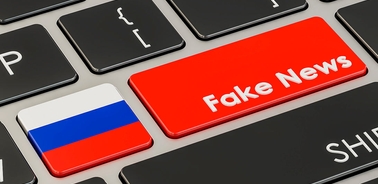- Home
- Our Purpose At Ie University
- Knowledge At Ie University
- Fear, Confusion, And Russian Propaganda
Fear, Confusion, and Russian Propaganda

What do Russian state propaganda, the European Union, the predictions of Nostradamus, and the coronavirus pandemic have in common? Keep reading to find out.
by Chris Kostov, Professor of International Relations at IE University.
This story has just about everything—even spies.
The coronavirus pandemic in Europe has become fertile ground for Russian state propaganda. Kremlin-controlled media outlets have spent the last couple months launching vicious attacks on the European Union. Taking advantage of the EU’s lack of unity in dealing with the pandemic, Russian propaganda has been multifaceted—literally on all fronts.
The EU, NATO, European leaders, European government policies, Western values such as freedom, democracy and human rights—nothing has been spared. Russian trolls have become increasingly inventive in their attempts to taint Europe through misinformation.
Examples of Russian propaganda and fake news are numerous. On Russia-24, the state-owned television channel, Dmitry Kiselyov claimed that the Schengen area had already collapsed as of March 16 because Germany, Austria, the Czech Republic, Lithuania, Denmark, and other EU countries had closed their borders.
According to RadioVesti, the coronavirus is devastating Europe and, after the pandemic, Germany, Italy, or both will leave the EU. The Russian Federal News Agency went even further: Russian journalist Anatoly Wasserman was quoted as saying that the EU and NATO would disintegrate as a result of the coronavirus.
What about spies?
Other contradictory Russian narratives have suggested that the coronavirus was a hoax; that it was created by the United States, the United Kingdom, Latvia, NATO, or the Belarusian opposition; that it was stolen by Chinese spies from Canada; and that Turkey holds the key to the secret of the coronavirus pandemic. The goals of this supposed bioweapon conspiracy vary according to the authors’ imagination: hurting Russia, destroying countries that are friendly to Russia (such as Italy), eliminating the freedom and human rights of Europeans, or confirming that liberalism is weak and unable to cope with a major challenge like a viral pandemic. According to a particularly inventive Russian interpretation of events, it has even been suggested that the Netherlands could somehow use the coronavirus to twist the MH17 trial against Russia.
Nostradamus and other predictions
If you are not perplexed enough by now, some Russian sources have even reached the supernatural realm, claiming that the Cold War–era Bulgarian psychic Baba Vanga or even Nostradamus predicted the coronavirus pandemic.
Svetlana Khorkina, a former Russian gymnast and member of parliament representing Putin’s party, put the icing on the cake with her bombastic claim that the West was being punished with the coronavirus and that the Tokyo Olympic Games were being postponed because of Western insults against Russia. According to Khorkina, “God protects our land.”
These contradictory claims and interpretations could mean that the Russian government, rather than defining a single narrative or theory, has selected a single target: the West.
The vicious West
The purposes of anti-Western rhetoric are multifold. To the domestic audience, Putin’s regime is trying to demonstrate once again that Russia’s authoritarian regime is superior to what the Kremlin views as the “wimpy, liberal EU governments.” The coronavirus pandemic could also be used as further proof that the vicious West that is conspiring to hurt righteous Russia.
If the domestic audience is important, capturing the attention of the Western public is priceless for a financially weak country like Russia. Propaganda is essentially another arm of Russia’s foreign policy and hybrid war against the West. Hence, instilling fear and confusion in Europe, discrediting Western values and institutions, and proving that Western liberal democracy does not work are among the major goals of this campaign.
Another curious goal of Russian propaganda is to brush up Russia’s image in the eyes of Europeans—to prove to them that Russia is a decent country with a strong and benevolent leader, always ready to help suffering Europeans, unlike the “evil and corrupt” EU and NATO, which are about to disintegrate anyway, according to “reliable” and “objective” Russian analysts. Between the lines, the message is that Europeans should insist on lifting the EU’s economic sanctions against Russia, which according to previous Russian propaganda claims have not worked anyway. This propaganda campaign is managed by so many different media outlets that the Kremlin has so far been able to deny any involvement.